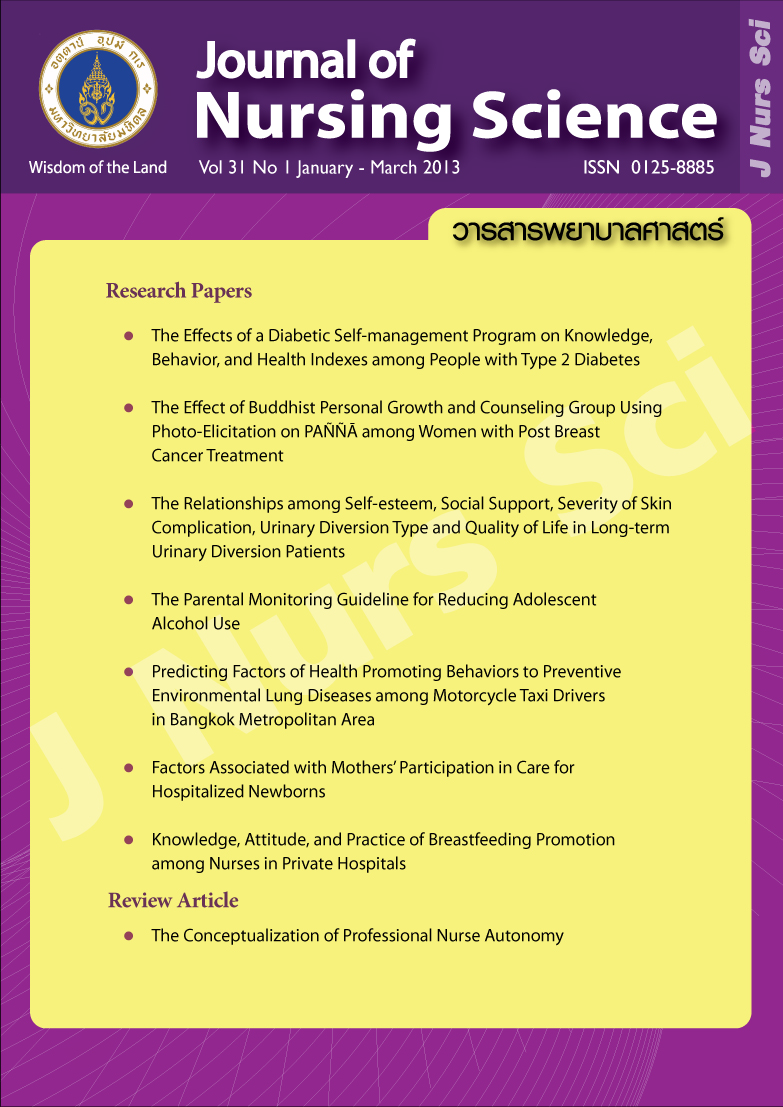The Effects of a Diabetic Self-management Program on Knowledge, Behavior, and Health Indexes among People with Type 2 Diabetes
Main Article Content
Abstract
Design: Experimental study design.
Methods: 117 people with type 2 diabetes were participated in the study. Participants were randomly selected from the population and randomly assigned into an intervention or a control group. Of all participants, 59 participants were in the intervention group (receiving a diabetic self-management program based on precede-proceed model and self-efficacy theory) and 58 were in the control group (receiving routine care). Data were collected by self-reported questionnaires and self-recorded diary. Data were analyzed using descriptive statistics (percentile, mean and standard deviation), and inferential statistics (t-test, chi-square, and repeated-measures analysis of variance).
Main findings: The findings showed that participants in the intervention group gained better knowledge, behavior, fasting blood sugar, and HbA1C than participants in the control group significantly. This diabetic self-management program was effective and had a medium to strong effect size and participants in the intervention group were able to maintain their healthy behavior for 18 months.
Conclusion and recommendations: Knowledge, skills training, nurse support including home visit, and self-efficacy were the cornerstone of this diabetic self-management program. It fostered people with type 2 diabetes to be able to control the level of fasting blood sugar and HbA1C. This program could be applied for other similar health care agencies.
Keywords: behavior, health index, knowledge, self-management program, type 2 diabetes
บทคัดย่อ
วัตถุประสงค์: เพื่อประเมินผลของโปรแกรมการจัดการเบาหวานด้วยตนเองต่อระดับความรู้ พฤติกรรมและดัชนี
สุขภาพของผู้เป็นเบาหวานชนิดที่ 2
รูปแบบการวิจัย: การวิจัยเชิงทดลอง
วิธีการดำเนินการวิจัย: ผู้เป็นเบาหวานชนิดที่ 2 ที่มีคุณสมบัติตามเกณฑ์ถูกสุ่มเข้าเป็นกลุ่มตัวอย่างจำนวน 117 คน และได้รับการสุ่มเข้าสู่กลุ่มทดลอง 59 คนและกลุ่มควบคุม 58 คน โดยกลุ่มทดลองได้รับโปรแกรมการจัดการเบาหวานด้วยตนเองภายใต้กรอบแนวคิด precede-proceed model และ self-efficacy ขณะที่กลุ่มควบคุมได้รับการดูแลตามปกติ เก็บข้อมูลจากการตอบแบบสอบถามและการจดบันทึก วิเคราะห์ข้อมูลโดยใช้สถิติเชิงพรรณา (ร้อยละ ค่าเฉลี่ยและส่วนเบี่ยงเบนมาตรฐาน) และสถิติอ้างอิง (t-test, chi-square, repeated-measures analysis of variance)
ผลการวิจัย: กลุ่มทดลองมีความรู้ พฤติกรรม น้ำตาลในเลือด น้ำตาลสะสมดีกว่ากลุ่มควบคุมอย่างมีนัยสำคัญ โปรแกรมมีค่าขนาดอิทธิพลปานกลางถึงสูง ผู้เป็นเบาหวานในกลุ่มทดลองสามารถรักษาพฤติกรรมสุขภาพคงอยู่นาน 18 เดือน
สรุปและข้อเสนอแนะ: การให้ความรู้คู่กับการฝึกทักษะ การสนับสนุนของพยาบาลรวมถึงการเยี่ยมบ้านและการสร้างเสริมสมรรถนะแห่งตนเป็นแกนสำคัญของโปรแกรมการจัดการเบาหวานด้วยตนเอง โปรแกรมช่วยให้ผู้เป็นเบาหวานควบคุมน้ำตาลในเลือดและน้ำตาลสะสมได้ดี ผลของโปรแกรมสามารถประยุกต์ใช้ในหน่วยงานอื่นที่คล้ายคลึงกันได้
คำสำคัญ: พฤติกรรม ดัชนีสุขภาพ ความรู้ โปรแกรมการจัดการตนเอง ผู้เป็นเบาหวานชนิดที่ 2
Article Details
Copyright Notice: Nursing Science Journal of Thailand has exclusive rights to publish and distribute the manuscript and all contents therein. Without the journal’s permission, the dissemination of the manuscript in another journal or online, and the reproduction of the manuscript for non-educational purpose are prohibited.

Disclaimer: The opinion expressed and figures provided in this journal, NSJT, are the sole responsibility of the authors. The editorial board bears no responsibility in this regard.


